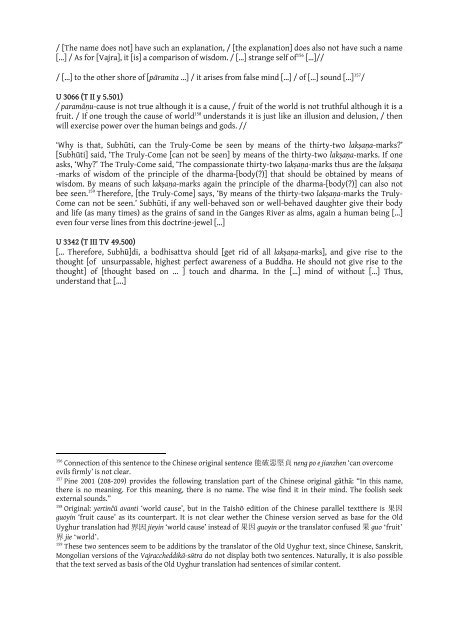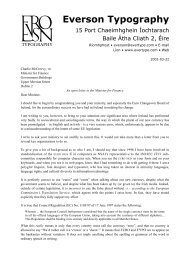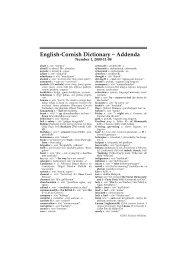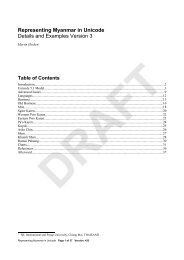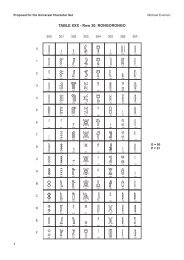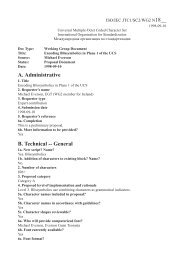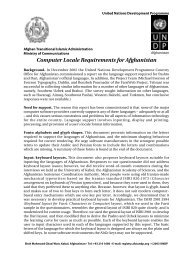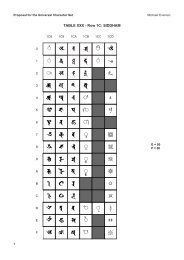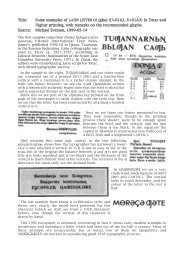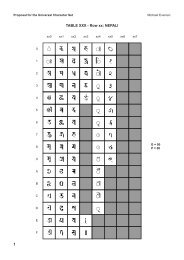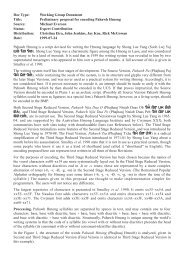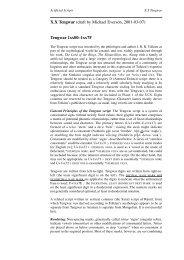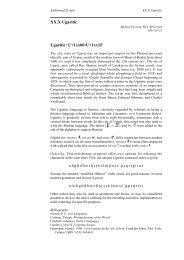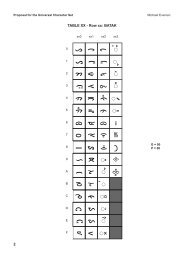The Vajracchedikā-sūtra with gāthās compiled by Master Fu - Evertype
The Vajracchedikā-sūtra with gāthās compiled by Master Fu - Evertype
The Vajracchedikā-sūtra with gāthās compiled by Master Fu - Evertype
Create successful ePaper yourself
Turn your PDF publications into a flip-book with our unique Google optimized e-Paper software.
[<strong>The</strong> name does not] have such an explanation, / [the explanation] does also not have such a name<br />
[…] / As for [Vajra], it [is] a comparison of wisdom. / […] strange self of 156 […]//<br />
/ […] to the other shore of [pāramita …] / it arises from false mind […] / of […] sound […] 157 /<br />
U 3066 (T II y 5.501)<br />
/ paramāṇu-cause is not true although it is a cause, / fruit of the world is not truthful although it is a<br />
fruit. / If one trough the cause of world 158 understands it is just like an illusion and delusion, / then<br />
will exercise power over the human beings and gods. //<br />
‘Why is that, Subhūti, can the Truly-Come be seen <strong>by</strong> means of the thirty-two lakṣaṇa-marks?’<br />
[Subhūti] said, ‘<strong>The</strong> Truly-Come [can not be seen] <strong>by</strong> means of the thirty-two lakṣaṇa-marks. If one<br />
asks, ‘Why?’ <strong>The</strong> Truly-Come said, ‘<strong>The</strong> compassionate thirty-two lakṣaṇa-marks thus are the lakṣaṇa<br />
-marks of wisdom of the principle of the dharma-[body(?)] that should be obtained <strong>by</strong> means of<br />
wisdom. By means of such lakṣaṇa-marks again the principle of the dharma-[body(?)] can also not<br />
bee seen. 159 <strong>The</strong>refore, [the Truly-Come] says, ‘By means of the thirty-two lakṣaṇa-marks the Truly-<br />
Come can not be seen.’ Subhūti, if any well-behaved son or well-behaved daughter give their body<br />
and life (as many times) as the grains of sand in the Ganges River as alms, again a human being […]<br />
even four verse lines from this doctrine-jewel […]<br />
U 3342 (T III TV 49.500)<br />
[… <strong>The</strong>refore, Subhū]di, a bodhisattva should [get rid of all lakṣaṇa-marks], and give rise to the<br />
thought [of unsurpassable, highest perfect awareness of a Buddha. He should not give rise to the<br />
thought] of [thought based on … ] touch and dharma. In the […] mind of <strong>with</strong>out […] Thus,<br />
understand that [….]<br />
156 Connection of this sentence to the Chinese original sentence 能 破 惡 堅 貞 neng po e jianzhen ‘can overcome<br />
evils firmly’ is not clear.<br />
157 Pine 2001 (208-209) provides the following translation part of the Chinese original gāthā: “In this name,<br />
there is no meaning. For this meaning, there is no name. <strong>The</strong> wise find it in their mind. <strong>The</strong> foolish seek<br />
external sounds.”<br />
158 Original: yertinčü avanti ‘world cause’, but in the Taishō edition of the Chinese parallel textthere is 果 因<br />
guoyin ‘fruit cause’ as its counterpart. It is not clear wether the Chinese version served as base for the Old<br />
Uyghur translation had 界 因 jieyin ‘world cause’ instead of 果 因 guoyin or the translator confused 果 guo ‘fruit’<br />
界 jie ‘world’.<br />
159 <strong>The</strong>se two sentences seem to be additions <strong>by</strong> the translator of the Old Uyghur text, since Chinese, Sanskrit,<br />
Mongolian versions of the Vajraccheddikā-<strong>sūtra</strong> do not display both two sentences. Naturally, it is also possible<br />
that the text served as basis of the Old Uyghur translation had sentences of similar content.


